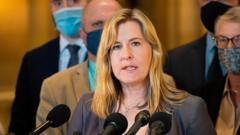Colombian senator Miguel Uribe Turbay remains in "extremely critical condition" after being shot at a public event in Bogota, sparking widespread public outcry and solidarity marches in response to the attack. Uribe's case has drawn attention to ongoing issues of political violence in Colombia as authorities investigate potential motives and involvement.
Colombian Senator Miguel Uribe Turbay in Critical Condition After Shooting Incident

Colombian Senator Miguel Uribe Turbay in Critical Condition After Shooting Incident
The hopeful presidential candidate faces a grim battle for survival following a violent attack that has ignited nationwide protests and renewed concerns over political violence in Colombia.
By now, we’ve all heard about the shooting of Colombian senator Miguel Uribe Turbay. The event has sent waves of shock throughout the country and prompted thousands to take to the streets in solidarity following his near-fatal attack.
On June 7, during a public gathering, Uribe was shot multiple times, sustaining severe head injuries that necessitated emergency surgery to address internal bleeding. His medical team has described his condition as "extremely critical," with his wife, María Claudia Tarazona, urging the public to offer prayers for his recovery.
The shooting, which took place in broad daylight, has rekindled fears of a return to Colombia's distressing past, marked by violence against political leaders during the late 20th century. This historical context adds gravity to the current atmosphere of tension and uncertainty surrounding the incident.
Following the attack, a 15-year-old suspect has been apprehended and charged with attempted murder. Additional arrests have been made, including one individual believed to have supplied the firearm used in the shooting and another accused of facilitating the attack. Despite these arrests, law enforcement officials continue to piece together the motives behind this violent act and determine if it is part of a larger conspiracy.
The tension escalated as protests emerged across various cities, where participants came together for silent demonstrations to show support for Uribe. These rallies captured national sentiment and rekindled discussions about political safety in a country that has historically faced challenges with violence against politicians. Uribe, a prominent conservative figure seeking his party's nomination for the upcoming 2026 presidential election, has a personal history that parallels the violence he now faces, as his mother was also a victim of political violence.
As the situation develops, Uribe’s recovering journey may not only impact his life but could also serve as a litmus test for political stability in Colombia. The unfolding drama highlights the intersection of violence, politics, and public sentiment in a country still grappling with its tumultuous history.
On June 7, during a public gathering, Uribe was shot multiple times, sustaining severe head injuries that necessitated emergency surgery to address internal bleeding. His medical team has described his condition as "extremely critical," with his wife, María Claudia Tarazona, urging the public to offer prayers for his recovery.
The shooting, which took place in broad daylight, has rekindled fears of a return to Colombia's distressing past, marked by violence against political leaders during the late 20th century. This historical context adds gravity to the current atmosphere of tension and uncertainty surrounding the incident.
Following the attack, a 15-year-old suspect has been apprehended and charged with attempted murder. Additional arrests have been made, including one individual believed to have supplied the firearm used in the shooting and another accused of facilitating the attack. Despite these arrests, law enforcement officials continue to piece together the motives behind this violent act and determine if it is part of a larger conspiracy.
The tension escalated as protests emerged across various cities, where participants came together for silent demonstrations to show support for Uribe. These rallies captured national sentiment and rekindled discussions about political safety in a country that has historically faced challenges with violence against politicians. Uribe, a prominent conservative figure seeking his party's nomination for the upcoming 2026 presidential election, has a personal history that parallels the violence he now faces, as his mother was also a victim of political violence.
As the situation develops, Uribe’s recovering journey may not only impact his life but could also serve as a litmus test for political stability in Colombia. The unfolding drama highlights the intersection of violence, politics, and public sentiment in a country still grappling with its tumultuous history.




















